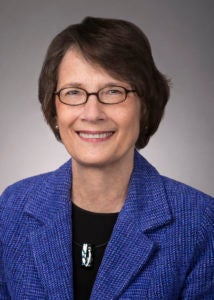Mary McClymont (L’76): Closing the Civil Justice Gap with Nonlawyer Navigators
April 6, 2020
“You have the right to an attorney.” That phrase, embedded in the Miranda warning, is one of the foundations of our legal system.

Mary McClymont (L’75)
But, of course, the protection only applies to criminal cases. With no federal right to counsel in civil matters, about 30 million people a year go without legal representation in state courts, where the vast majority – 98 percent – of civil cases are filed annually.
Among low-income Americans, 86 percent report receiving inadequate or no legal help in potentially life changing civil cases – from evictions to child custody to debt collection.
Courts across the country are finding creative solutions to fill the void, according to research by Mary McClymont (L’76), a senior fellow at Georgetown Law’s Justice Lab. She studied the rise of “nonlawyer navigators,” laypeople who operate within the courts to help self-represented litigants decipher complicated, often confusing, legal processes.
“Sadly, we have not paid enough attention to this huge invisible problem in our country, the civil justice gap,” McClymont said. “There are very serious consequences. Think about being evicted from your home, not being able to pay your debts, domestic abuse. You can lose your livelihood, your family, your home – and you may have no representation in those matters.”
COVID-19 and Inequality
At least one party is unrepresented in about three-quarters of civil cases in state courts, leaving them at a distinct disadvantage. At a time of extreme uncertainty, with millions of workers’ livelihoods on the line, the COVID-19 outbreak is now intensifying existing inequalities. Thinking creatively about how to address legal ramifications is more important than ever.
“A crisis like this just magnifies issues around access to justice for unrepresented people,” McClymont said.
McClymont’s report, “Nonlawyer Navigators in State Courts: An Emerging Consensus,” looks at 23 programs in 15 states and the District of Columbia, surveying a wide range of models. Some use paid nonprofit employees, others rely on college and law students, and retirees.
The navigators’ tasks are as varied as their backgrounds. Much of their work is centered on making courts less intimidating, from helping self-represented litigants complete paperwork and find their way around the courthouse, to translating documents and providing practical procedural information.
Making Court More Accessible
In conversations with more than 60 individuals who created, oversee, or manage these programs around the country, McClymont found that navigators enhanced the effectiveness of courts, helped build public trust, and allowed lawyers to operate “at the top of their licenses.” Interviewees emphasized that the navigators’ training and supervision ensure that they provide valuable legal information, but not legal advice, which only lawyers are authorized to do.
One of the programs in McClymont’s study, Illinois JusticeCorps uses AmeriCorps members in 13 courthouses throughout the state to help the growing number of litigants appearing in court without lawyers.
“We’re trying to make the courthouse a slightly more friendly place, more accessible,” said Program Operations Director Stacey Jonas Weiler. “Being able to talk to someone ahead of time to understand the options you have can make a huge difference. Even if the outcome is the same, those litigants feel far more heard.”
Illinois JusticeCorps started as a pilot program in the wake of the 2008 financial crisis when a wave of foreclosures swept the state. Just as navigators helped self-represented litigants “not fall through the cracks” then, they may again be especially important once courts reopen after the coronavirus crisis, Jonas Weiler said.
“After the dust has settled, it’s going to be really crucial for everyone that finds themselves trying to navigate their legal issues to get accurate information and understand what their options are,” she added.
A Passion for Social Justice
McClymont’s research was fueled by a passion for social justice work. After graduating from Georgetown Law, she joined the Civil Rights Division of the U.S. Department of Justice as a trial attorney. During that time, and later as senior staff counsel for the National Prison Project of the American Civil Liberties Union, she developed an interest in international human rights.
After pursuing an LL.M. in International Human Rights and Humanitarian Law from American University, McClymont and went on to serve as a national director of Migration and Refugee Services of the U.S. Catholic Conference, vice president in charge of the Peace and Social Justice Program at the Ford Foundation, chief executive officer of InterAction, executive director of Global Rights, and most recently, president and chief executive officer of the Public Welfare Foundation.
Now, McClymont has returned to Georgetown Law as a senior fellow with the Justice Lab and an adjunct professor who has co-taught “Tackling the Civil Access to Justice Crisis” with Adjunct Professor Lisa Dewey.
Georgetown Law is “even stronger in terms of its clinical programs and even more entrepreneurial than it was in my day,” McClymont said. “There are so many practicums and so many ways for law students to get exposure to social justice concerns.”
Active Debate on Reform
To get involved in filling the civil justice gap, Justice Lab Co-Director Tanina Rostain said Georgetown Law students and alumni can “encourage courts to develop the kinds of innovative programs that allow navigators to help people solve their legal problems.”
“There’s a very active debate about regulation and about reforming rules so that there are fewer restrictions on what nonlawyers can do,” Rostain said. “Utah, Arizona, Washington and other states are all experimenting with models that allow nonlawyers to assist people with legal issues.”